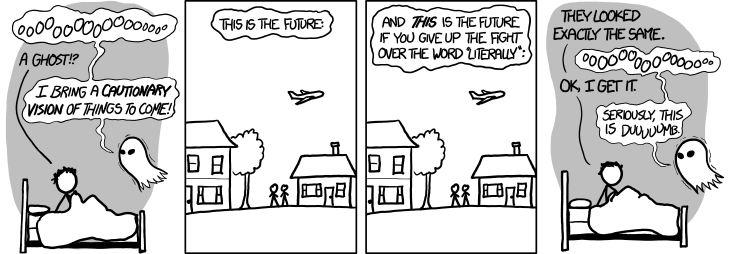Perhaps I've always been wrong.
I've always been one to really notice when other people don't use proper grammar. I blame my mother for this. To us both, seeing something grammatically incorrect is like hearing fingernails being dragged across a blackboard.
Yet over the years we've both been put into a great many positions where this has caused problems. It mortifies me when I look back at tracts of writing and find errors, and I'm one to extensively rewrite and proofread everything I write - blog posts, e-mails, even texts in the few instances where I've written them. Heck, I just rewrote the entire previous sentence out of a mix of habit and compulsion.
Part of this stems from a kind of perfectionism that I've had to overcome in order to finish any creative endeavor I've ever undertaken. Part of it is as I've recounted - a lifelong obsession with proper grammar. But truth be told, I think a lot of it has come from not wanting to look like a fool on the Internet, which is a vast, wonderful, and occasionally scary place where first impressions mean a lot more and false information travels with the same speed as fact.
Grammar is supposed to make language clear, concise, and intelligible. We may be able to understand simple language devoid of grammatical rules, but the ability to truly and deeply understand nuances in a society without grammar is tantamount to impossible. Even with the seemingly arbitrary rules which grammar provides for us, there is the possibility for misunderstanding. That's another slice of the equation for me - a fear of being misunderstood. All too often I fear as if this has worked against me, almost as if my compulsion to refine and rewrite actually decreases my overall clarity.
This is why there is nothing like talking to someone face to face. Writing is full of pitfalls of miscommunication and misunderstanding, regardless of grammar. Body language and tone of voice communicate far more than words can alone, and what would otherwise be an ambiguous sentence in text can be as clear as a midday sky with tone of voice and perhaps a few well-placed hand gestures.
That said, much of grammar is an exclusively textual thing. It's technically not right to end sentences with prepositions as much as it's technically not right to split infinitives, but this is how we talk. I do it far more than I can even keep up with because, for all my inclination for noticing these kinds of errors, they are so deeply ingrained into the way we speak that they go past my ears without That Part of my brain catching them.
I have gotten better at this, I think. Other's grammatical shortcomings don't bother me nearly as much as they used to, although I tend to squirm internally every time someone screws up the usage of "well" and "good." Grammar takes the role of guidelines rather than rules - important, to be sure, but not the be-all end-all by-the-book my-way-or-the-highway set of rigid rules that must be followed.
Part of this was my realization that the world won't change, especially since I've never been one to point out another's grammatical mistakes unless a) I've turned into a jerk after a very bad day, or b) someone says something so incontrovertibly and unbelievably stupid that pointing out typos and grammar flaws becomes a mere bullet in a round of ammunition, which I proverbially load if I so choose. Otherwise, since I wasn't trying to fix what I saw as a relatively minor (but annoying) issue, it was an internal problem.

[xkcd #1108]
But back to my opening point: perhaps I'm wrong about all of this. Perhaps my view of grammar, though evolved from an admitted high horse, is still too high of an expectation. Perhaps I've spent too much time on the Internet where folks don't have qualms about not capitalizing their sentences or ending them with punctuation. If my position had never evolved at all, I'd be unable to enjoy half of the things I do - heck, I'd be incapable of making up any of my status updates (despite the recent claims of a quasi-anonymous member on a popular blogging platform, I maintain that they are hilarious).
I'm not perfect and I've come to realize that many things I thought to be immutable facts all of five years ago are suddenly not. I attribute a lot to those who talk about social justice, and although I have my problems with its surrounding culture, I'd be a lot worse of a person overall if I were still in the dark about those kinds of issues.
My sense of what people should and shouldn't do when it comes to this matter has eroded, as in the examples I mentioned above, but is it wrong of me to ever mention someone's error online if I am unaware of the poster's background? I occasionally provide helpful feedback to members in the Library about grammatical or spelling errors I find, if there is a repetition of the same error, but a) I keep it as helpful and non-confrontational as possible, and b) it is out of not wanting anyone else to be perceived poorly because of a simple mistake. If someone is consistently misspelling a certain word or typing in run-on paragraphs, I feel as if it's part of my duty - especially as a staff member - to help.
There is only one time in recent memory where I chided someone for their grammatical inadequacy, and it was in response to the same quasi-anon I mentioned earlier. In a series of four messages, each less coherent than the last, their grammar deteriorated along with the logic behind their argument. In my responses to these messages, I dedicated scant few sentences - two or three out of veritable walls of text - to examining their lack of grammatical accuracy as a tangential point to my logical deconstruction of their argument. I was not going after them solely because of this, and in fact, I would say that the vast, vast majority of what I wrote pertained to breaking apart a really weird and problematic point of view.
But even in that mere sliver which I devoted to the side-note of pointing out their lack of grammar, did I go too far? Is it a stain on my escutcheon caused by overzealousness in annihilating a harmful point of view?
I don't know, but maybe I was wrong to do so.
And if I was wrong then, perhaps I always have been.
-
 1
1



9 Comments
Recommended Comments